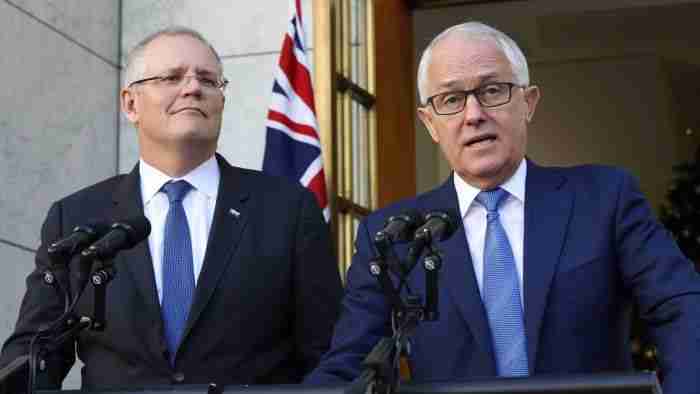
Banking Inquiry – Presumably the political link between the corporate giants and the political party that advocates on behalf of “business’ is nowhere near as direct as that which exists between the ALP and the affiliated trade unions.
Still, it is interesting to ponder what the political consequences of the banking inquiry might be, writes Dr Nick Economou
The federal royal commission into Australia’s financial services sector headed by former High Court justice Kenneth Hayne has become arguably the biggest show in town.
Convened quite grudgingly by the Turnbull government after a long period of resisting calls for an inquiry in to the behaviour of Australia’s major retail banks in particular, the royal commission has been nothing short of spectacular with its endless array of tales of outrageous (and often quite illegal) behaviour and a line of corporate executives tending their resignations as a result.
The origins of this inquiry lay in the revelations of poor behaviour particularly on the part of those working in the area of providing financial advice to banking customers. This has been a burgeoning industry driven by the implementation of the compulsory superannuation policy by the Hawke Labor government back in the 1980s.
 Indeed, a number of major reforms were enacted back then whose consequences are now being examined by the Haynes royal commission.
Indeed, a number of major reforms were enacted back then whose consequences are now being examined by the Haynes royal commission.
These include the privatisation of some former state banks (the Commonwealth Bank), the de-regulation of the banking sector and the de-mutualisation of former mutual companies including the Australian Mutual Provident (AMP).
The AMP was formed in 1849 as a non-profit mutual benefit society to allow the better-off working class to take out health and life insurance in times when state provided welfare was non-existent. In the mid-1990s the mutual society sought to take up the opportunity to re-cast itself as a public listed company, and thus de-mutualised.
Instead of being answerable to members of the society it was now answerable to shareholders and to the newly created Australian Securities and Investment Commission. Indeed, AMP de-mutualised in the same year ASIC was created by John Howard’s Liberal-National coalition government in 1998!
The irony of this is that both the AMP and ASIC have been front and centre in the revelation of illegal and unethical behaviour on the part of the company, and what looks like either benign neglect or breathtaking incompetence on the part of ASIC to oversee the financial services sector.
The unconscionable behaviour of AMP has been so exposed in these early days of the royal commission that a swathe of the company’s executive board have resigned.
Meanwhile, the inadequacies of ASIC have been so thoroughly exposed that even financial services minister Kelly O’Dwyer agrees that there needs to be tougher regulation of the sector. This is a reversal of her previous position that ASIC was doing a fine job and that calls for a banking inquiry were nothing but populist trouble making from the Labor party.
In looking at the Hayne inquiry in to the banks one can’t help but recall the inquiry the Abbott government launched in to trade unions not long after it was elected back in 2013.
That was also a somewhat riveting inquiry, although as a journalist pointed out recently, whatever crimes were alleged against union officials none involved accusations of losing millions of client dollars. One interesting point of difference between the two inquiries, however, relates to the proximity of the major political parties to the miscreants being brought to account before the respective royal commissioners.
In the union inquiry, the Australian Labor Party was also in the dock. Indeed, this was literally the case when both former prime minister Julia Gillard and current opposition leader Bill Shorten were summoned to give evidence.
By way of contrast, no Liberal minister has been called before the commissioner of inquiry in the banking matter.
Presumably the political link between the corporate giants and the political party that advocates on behalf of “business’ is nowhere near as direct as that which exists between the ALP and the affiliated trade unions. Still, it is interesting to ponder what the political consequences of the banking inquiry might be.
One of the early political themes emerging from the inquiry as it has proceeded thus far has been the extent to which Liberal minister have sought to claim credit for instituting and inquiry they have previously fought tooth and nail to prevent.
In this the handful of National party members, the most prominent of whom would be the NSW senator John “Whacka” Williams, deserve the credit for getting this extremely important inquiry under way. The National party backbench has long championed the cause of rural interests who appear to have born a not insubstantial proportion of the burden created by the behaviour of the financial services sector.
Their pursuit of this matter has been dogged, and they refused to be put off by mealy mouthed declarations from their urban Liberal colleagues that ASIC had the behaviour of the banks under effective regulatory review.
This means that there could be another interesting contrast between the banking and trade union commissions. For all the heat generated at the inquiry itself the union royal commission did not reveal anything that observers of union behaviour did not already know about, and the policy consequences were limited to the building and construction sector.
In other words, the consequences of the inquiry were not that great especially for the vast bulk of the community.
The consequences of the banking inquiry, on the other hand, may be very significant indeed. The size and reach of the financial services sector within the Australian economy is enormous, and its effect touches nearly everyone in the community.
With such glaring instances of misbehaviour being exposed so far, and doubtless more to come, the Turnbull government has set itself an enormous task to try to institute a regulatory regime that assures the community of the probity and competence of the banking and financial services sector.
One wonders if the prime minister and his colleagues are up to the challenge.
(Dr Nick Economou teaches Politics at Monash University’s Clayton campus and is a regular commentator on Australian Radio and Television)
Similar Posts by The Author:
- Having failed the COVID crisis, Morrison now failing the China crisis
- Missing the point in Bridget McKenzie Sports Funding controversy
- The China paranoia in Australian politics
- Minor party politics:Putting One Nation into perspective
- Turnbull Government ends the Year with a Flourish, but still behind in the Polls

